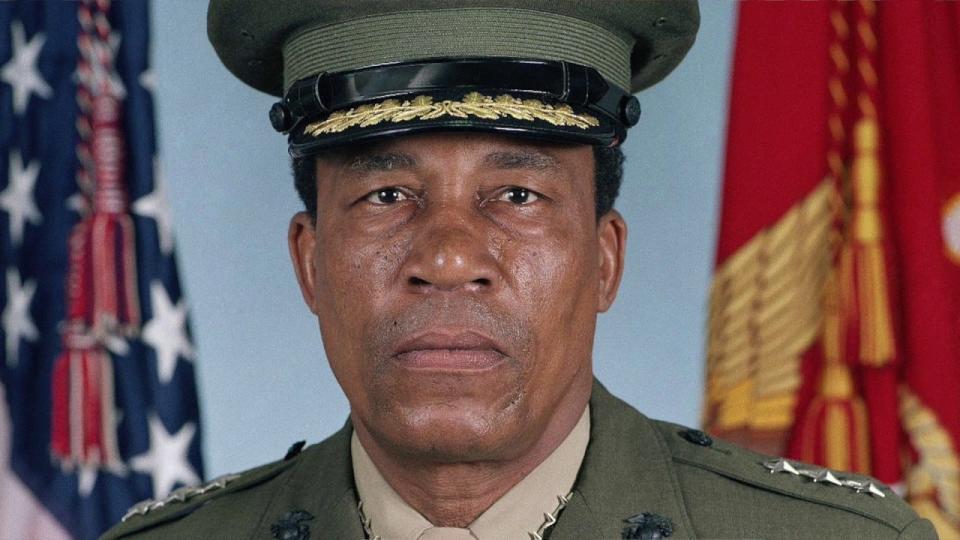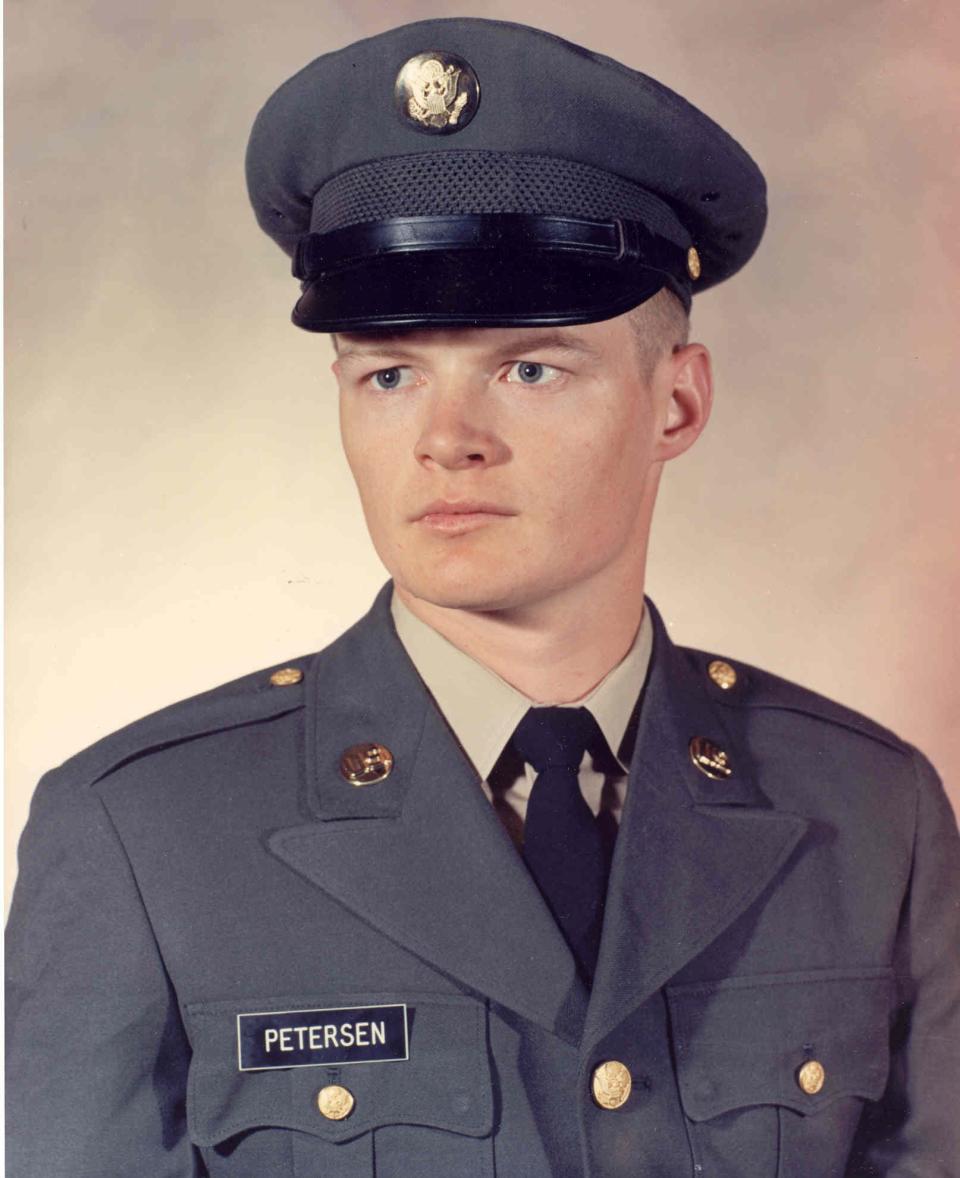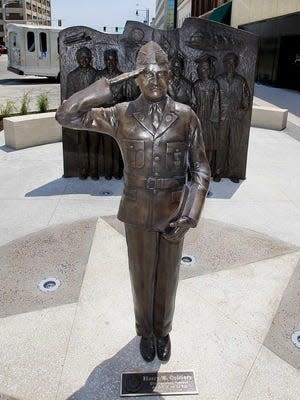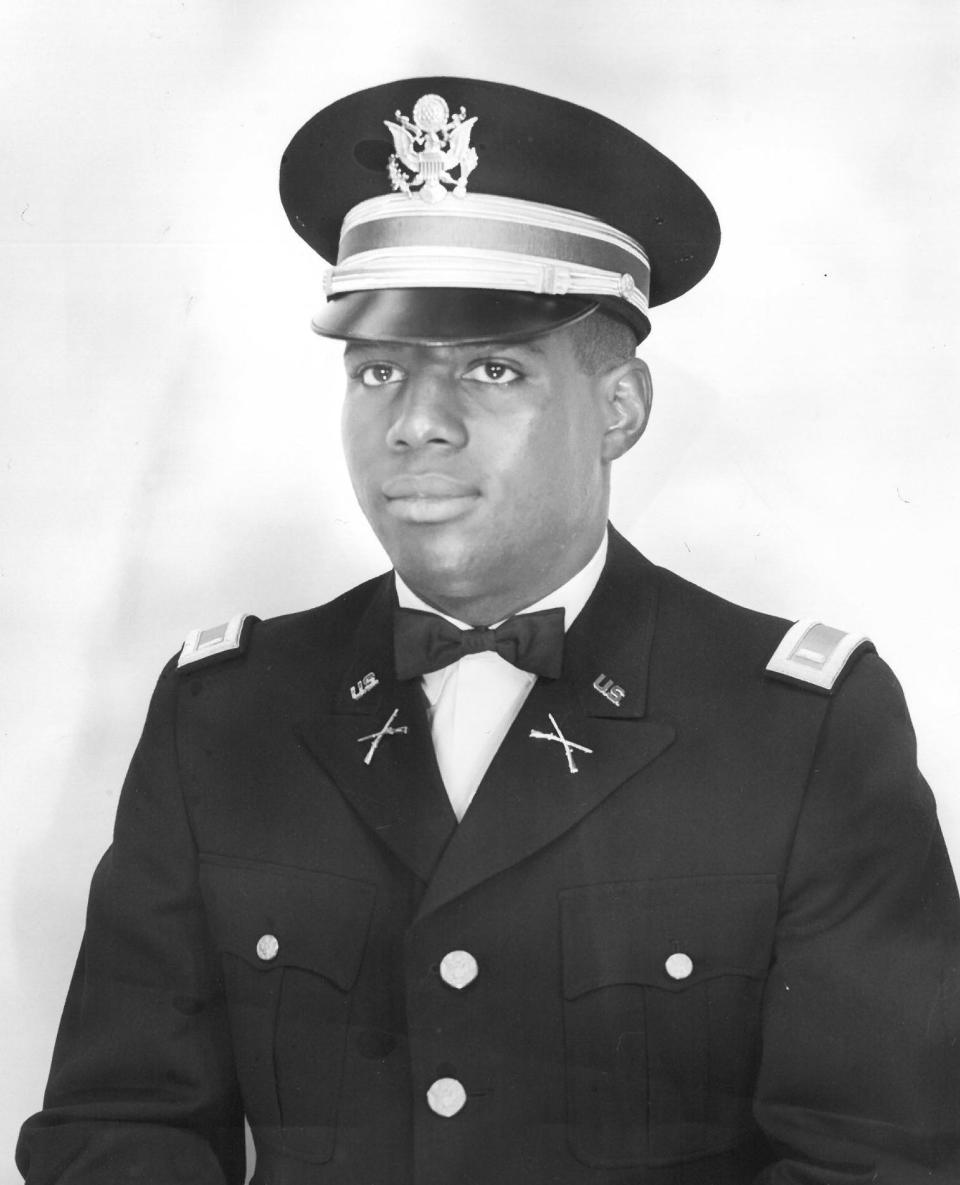GI Bill author, first Black pilot in the Marines among 10 Topeka-area veterans we recognize Thursday

A Topekan was the principal author of legislation that enabled millions of veterans to afford to go to college.
Another Topekan was the first Black pilot and later the first Black general in the Marine Corps.
Still another northeast Kansas resident, who was a former Topekan, performed acts of valor that won him the Medal of Honor but cost him his life.
With Thursday being Veterans Day, The Topeka Capital-Journal celebrates these 10 from among the many significant U.S. military members who have called northeast Kansas their home.
Frank E. Petersen Jr.

Frank E. Petersen Jr. rose to the rank of lieutenant general in the Marine Corps, said Donna Rae Pearson, local history librarian for the Topeka and Shawnee County Public Library.
Petersen was born in 1932 in Topeka and graduated in 1949 from Topeka High School. He enlisted in the Navy in 1950, then left in 1952 to become the first Black pilot in the Marine Corps. He went on to become the first Black general in the Marines.
Petersen flew more than 350 combat missions and more than 4,000 military aircraft hours during the Korean and Vietnam Wars, suffering injuries when he bailed out after a shell hit his plane during a mission in 1968.
Petersen retired from the Marines in 1988 at the rank of lieutenant general, or three-star general. He died in 2015. The Navy in 2018 launched and christened a destroyer that had been named posthumously in his honor.
More: Trailblazing Black Topeka airman’s name misspelled on his honorary street
Olivia Hooker

Olivia Hooker, a former Topekan, was one of the first members of the U.S. Coast Guard Women's Reserve, Pearson said.
Hooker was born in 1915 in Muskogee, Okla., and lived in Tulsa when she survived that city's 1921 race massacre, during which between 75 and 300 Black people were killed. She and her family lived for a time after that in Topeka.
Hooker entered the Coast Guard Women's Reserve in February 1945 and earned the rank of yeoman, second class, before her unit was disbanded the following year.
Hooker subsequently embarked upon a teaching career, which saw her retire as an associate professor of psychology at Fordham University in New York. She died at age 103 in 2018.
William D. Matthews

While members of the 54th Massachusetts Volunteer Infantry Regiment are widely celebrated for being among the first Black soldiers to fight for the Union in the Civil War, the first actual first Black members to fight were those of the 1st Kansas Colored Infantry led by Capt. William D. Matthews, said Eric McHenry, professor of English at Washburn University.
Matthews was born in 1827. He had an edge in recruiting Black volunteers because a hotel he owned in Leavenworth was a stop on the Underground Railroad, and he helped more than 100 slaves escape, McHenry said.
"In October of 1862, the 1st Kansas Colored Infantry seized a farm in Missouri owned by a Confederate sympathizer and renamed it 'Fort Africa,'" he said. "Using it as a base, they then routed 500 Confederate guerillas despite being outnumbered 2-to-1. Their success in what’s now called the 'Island Mound Skirmish' cleared the way for all the Black regiments that followed, including the 54th Massachusetts."
Matthews died in 1906.
More: Let us remember and honor World War II Rangers with the Congressional Gold Medal
Danny J. Petersen

Danny J. Petersen, 20, was mortally wounded in 1970 while standing alone holding, off numerous North Vietnamese troops so his fellow soldiers could withdraw. His heroism posthumously won him the U.S. military's highest decoration, the Medal of Honor.
Petersen was born in 1949. He grew up in northeast Kansas, at one point living in Topeka.
Petersen held the rank of Specialist 4 in 1970 when he maneuvered the armored personnel carrier he commanded into a position between North Vietnamese troops and a disabled U.S. armored personnel carrier, enabling that vehicle's crew to repair it.
He then carried his own vehicle's wounded driver 45 meters across a bullet-swept field to a secure area before returning and providing covering fire as his fellow soldiers withdrew.
Petersen is buried in Netawaka Cemetery in Jackson County. A stretch of US-75 highway north of Holton is named in his honor.
Harry W. Colmery

Topeka attorney Harry W. Colmery was the principal author of the GI Bill, a federal law that provided benefits for military veterans returning from World War II.
Born in Pennsylvania in 1890, Colmery got a law degree in 1916, then served as an instructor and pursuit pilot for the Army during World War I. He moved to Topeka after the war to practice law.
Colmery served from 1936 to 1937 as national commander of the American Legion.
He wrote the initial draft of the Serviceman’s Readjustment Act of 1944, which is better known as the GI Bill of Rights. The GI Bill provided books, tuition and a monthly stipend for veterans attending colleges and universities.
Colmery died at age 88 in 1979. A life-sized statute of him stands in downtown Topeka while Topeka's Colmery-O'Neil VA Medical Center is named partly in his honor.
Joseph B. Anderson Jr.

Topeka native and Army Captain Joseph B. Anderson Jr. was named 1967 "Kansan of the Year" by The Topeka Capital-Journal for his exploits as a platoon leader in Vietnam.
Anderson was born in 1943, graduated in 1961 from Topeka High School, then graduated from the U.S. Military Academy at West Point.
During the Vietnam War, he commanded a platoon with which French filmmaker Pierre Schoendoerffer was temporarily embedded.
Schoendoerffer made a film, "The Anderson Platoon," which focused on Anderson and his soldiers for six weeks at the height of fighting in Vietnam in 1966. The film was released in the U.S. in 1967. It won an Academy Award for Best Documentary Feature.
After leaving the Army, Anderson embarked on a business career. He is chairman and CEO of TAG Holdings, LLC, a corporation he founded in 2001 that helps customers control costs, optimize operational efficiencies, improve margins and increase cash flow.
Bernard William Rogers

Bernard William Rogers, a native of Fairview in Brown County, attained the rank of four-star general, serving from 1976 to 1979 as chief of staff of the U.S. Army and from 1979 until his retirement in 1987 as supreme commander of the 16-member North Atlantic Treaty Organization.
Rogers was born in 1921 at Fairview and spent a year at Kansas State University before attending the U.S. Military Academy at West Point, where he graduated in 1943.
Rogers taught at West Point for the rest of World War II, then held command assignments in the Korean War and Vietnam War.
During the latter, he received the Distinguished Service Cross for leading a successful counterattack against a Vietcong raid.
More: Applications open Nov. 10 for Topeka Habitat for Humanity's new House to Home program
Rogers' concern for the welfare of the common soldier was a hallmark of his career, according to the website of the Kansas Historical Society. He died at age 87 in 2008.
Sherman Oyler Jr.

For decades, Sherman Oyler Jr. told his students in Topeka USD 501 about his experiences parachuting into occupied France during the Allied D-Day invasion on June 6, 1944.
Oyler was born in 1920. He grew up in Wellington in south-central Kansas, then became an Army paratrooper in World War II.
Oyler came forward and briefly spoke with Allied Commander Dwight D. Eisenhower, who was from Kansas, when Eisenhower asked to see soldiers from Kansas as he addressed troops hours before the D-Day invasion began.
After the war, Oyler earned a college degree and taught history at Topeka schools that included Jardine Junior High and Highland Park Junior High. He died at age 78 in 1999.
Blanche Kimball

Blanche Kimball, of Topeka, was among the 77 U.S. military nurses taken prisoner in 1942 when the Japanese captured the Philippines. Those nurses were known as the "Angels of Bataan and Corregidor."
Kimball was 39 in 1941 when the Army gave her what was considered to be a desirable assignment in Manila. But after being captured by the Japanese, she suffered from health problems and lost 60 pounds.
In her 2013 book, "We Band of Angels," author Elizabeth Norman wrote that Kimball got the attention of her fellow nurses with her flair for telling fortunes with playing cards. Those nurses were all still alive and working when they were liberated in 1945.
Kimball lived after the war in Topeka, where she died at age 77 in 1979.
More: 'The work does not stop': Topeka leaders reflect on city's growth, future at State of the Community
Ralph G. Redmond

Lt. Ralph G. Redmond was the first of the 39 U.S. military members killed in Vietnam who listed Topeka as their home of record.
Redmond, 26, was an assistant adviser for the U.S. Army in that country when he died in a land mine explosion in 1964, before U.S. combat operations there escalated.
Redmond was born in 1938. He graduated in 1956 from Topeka High School and earned a basketball scholarship to what is now Pittsburg State University, where he took part in the ROTC program. After graduation, he became a first lieutenant in the Army.
Redmond died helping a South Vietnamese infantry battalion as it sought to clear enemy guerrillas from a jungle-covered mountain area. A South Vietnamese soldier stepped on a land mine, killing himself, Redmond and two other South Vietnamese soldiers.
This article originally appeared on Topeka Capital-Journal: On Veterans Day, Topeka-area military members celebrated for service

